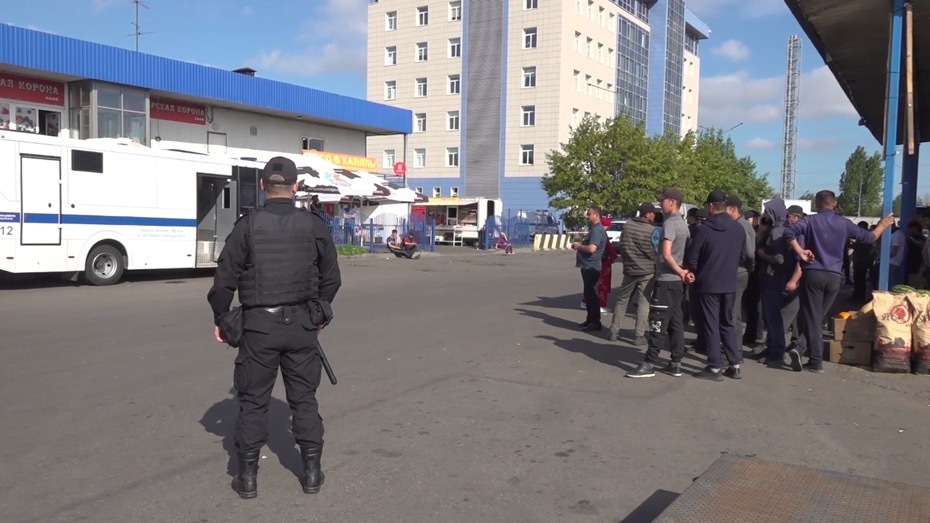
A calling to arms for a migrant: how new Russian citizens are put on military registration
Elena Petrova, Natalia Seibil
The first reports of the raids came from Kaluga. Then messages from St. Petersburg appeared in TG. A «migration raid» took place there, which revealed about 100 migrants with Russian citizenship. They were taken to the military enlistment office for registration.
«The migration raid carried out over two days at the Sofia vegetable depot brought results to both the police and military enlistment offices. Fellow countrymen of verified foreigners, but already citizens of Russia, police officers identified more than a hundred. Almost all of them were taken to the military enlistment office for the procedure of military registration, » the police said.
And that's where the fun began.
As a rule, migrants from Central Asia have two citizenship, so they do not have the right to be conscripted for military service. However, nothing prohibits signing a contract with the Ministry of Defense, according to which new Russians go to defend their second homeland. It is about this way to get replenishment that human rights activists report. Foreign agent Svetlana Gannushkina, who has been dealing with migrants all her life, told Novye Izvestia that military enlistment offices across the country are actively «engaged» in her wards:
— I know that now, before giving a Russian passport, people are sent to the military enlistment office. This causes me great concern. But this does not happen in all regions of the federation. Kaluga was the first to talk about it. Then our lawyers from different regions began to speak out. We did not encounter this in Moscow. In some regions, a mandatory requirement is to register with the military enlistment office. And somewhere they offer to immediately conclude a contract in a voluntary-compulsory manner.
Russian citizenship has turned from a welcome boon into a trap for migrants.
Now the Human Rights Council, represented by its chairman Fadeev, has announced to everyone who wants to get a Russian passport that now the fastest way to get it is through Ukraine. The dilemma for migrants is not «military registration or passport», but «military contract or passport». As they say in Odessa, these are two big differences. For those who do not know, we remind you that contractors, under the terms of the Ministry of Defense, serve until the end of hostilities. It hasn't served you for a year, and if you're lucky, you can go home.
What is the amount of fresh replenishment from among migrants that the Ministry of Defense is counting on?
According to the Ministry of Internal Affairs, 269 thousand people received Russian citizenship in 2018, 498 thousand in 2019, 656 thousand in 2020. In 2021, 735 thousand people became Russians, in 2022 — slightly less, 691 thousand people. Only last year was different from the previous ones — about 40% of the total number were immigrants from Ukraine. Over 5 years, 3 million people have received passports.
Sociologist Anna Rocheva points out that there is no reliable data on the age, gender, marital status of those coming to work in the public space. However, migration scientists believe that only 20% of Central Asians are women:
«Men mostly come from Central Asia. If you look at the age distribution, it is clear and expected that mostly young people are going. Most of all men are under the age of 30, slightly less — from 30 to 40 years, older men — even less.»
Even if we assume that half of those who have received passports do not fall under military registration, it is clear why a real hunt is unfolding for migrants — potentially up to one and a half million people can be sent to the front. The military can only dream of such an addition.
It has become much easier to take away a passport from dissenters in Russia than to get it. In April of this year, President Putin signed a new law «On Citizenship of the Russian Federation». Now the law distinguishes citizenship by birth and acquired citizenship. So, those who have received second-class citizenship may lose it for «discrediting the Armed Forces of the Russian Federation and actions threatening national security.» For former migrants, the old rule remains familiar to them to tears: they don't like it — a suitcase, a train station, Dushanbe (Bishkek, Tashkent, Baku …).
Do migrants with Russian passports have a choice? Probably there is, but he is not rich. They are trying to refocus on Kazakhstan, which has turned from a donor to a recipient of labor force for quite a long time.